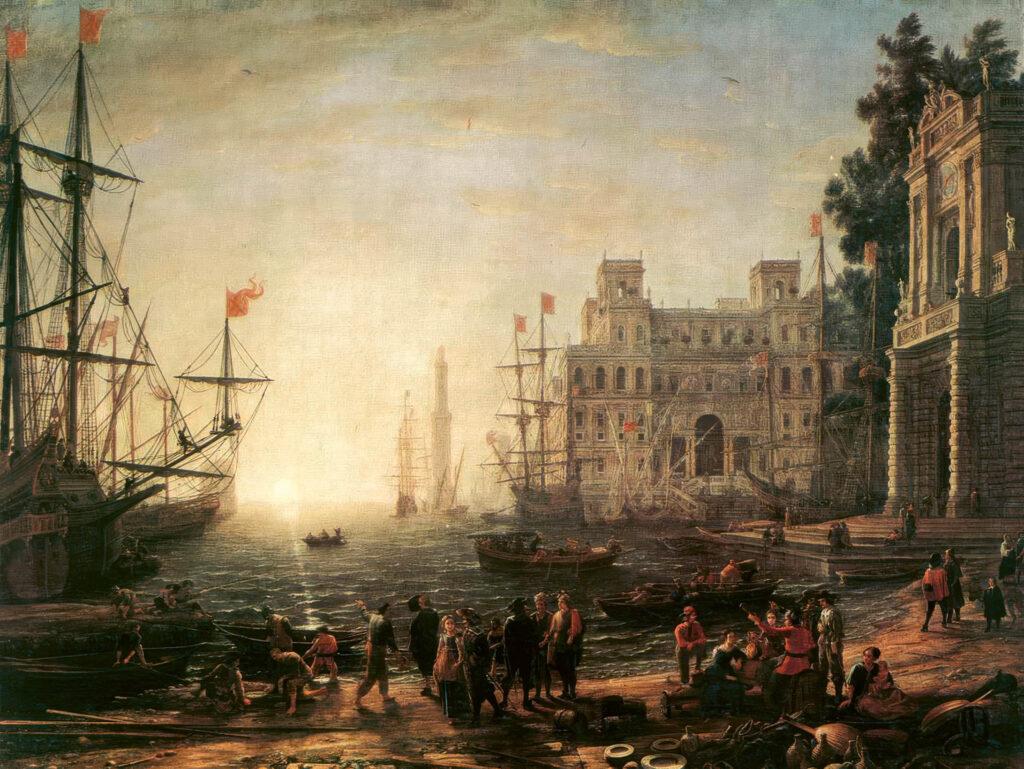This article was originally published in Vol. 5 No. 3 of our print edition.
Heated debates over politics, policy, and ideology obscure a fundamental truth: politics is, at its core, about contending moral visions. Behind every policy proposal, social movement, and political identity lie ethical assumptions about human nature, society, and the proper ordering of our collective life. These assumptions are rarely explicit, yet they shape our political landscape more profoundly than any election or legislative battle.
The progressive worldview that dominates much of Western intellectual and cultural life rests on several key moral narratives that have evolved from academic discourse into political doctrine. While presented as self-evident truths, these narratives contain fundamental flaws that undermine their validity and the policies they inspire. By examining these narratives critically, we can gain a deeper understanding of the nature of our political disagreements and why specific progressive policies often fail to achieve their stated aims, despite their apparent moral appeal.
This article examines three central metanarratives that underpin progressive thought: the myth of the blank slate, the idealization of pre-industrial societies, and the environmental critique of industrialization. Each of these narratives contains a moral vision that shapes how progressives understand human nature, history, and our relationship with the natural world. Each rests on premises that are empirically dubious and philosophically problematic, yet continue to radically shape contemporary Western policy.
Theoretical Framework: Discourse vs Ideology
To understand how progressive metanarratives shape our political landscape, we must first distinguish between discourse and ideology, two related but distinct concepts that help explain how ideas move from academic theory to political practice.
Discourse, as conceptualized by Michel Foucault and Stuart Hall,1 refers to the broader cultural frameworks and systems of meaning that unconsciously shape how we perceive and interpret the world. Discourses operate beneath the level of conscious awareness, framing our understanding of reality in ways we rarely question. As Foucault argued, discourses are inseparable from power, they establish the boundaries of acceptable thought and normalize specific perspectives while marginalizing others.
Ideology, by contrast, represents a more explicit, intentional, and politically directed system of beliefs. Drawing from Marxist tradition and refined by theorists like Ernesto Laclau, ideology can be understood as a coherent set of ideas that serves particular social interests. While discourse shapes our unconscious understanding of the world, ideology provides a conscious framework for interpreting social reality and advocating for specific political goals.
This evolution is particularly significant because it often occurs without explicit acknowledgement of the moral foundations upon which these ideas rest. Whether progressive or conservative, every political worldview is ultimately grounded in moral assumptions about human nature, justice, and the good society. As psychologist Jonathan Haidt has demonstrated,2 our political positions are primarily driven by moral intuitions, with rational arguments serving mainly to justify conclusions we have already reached on ethical grounds.
‘Progressive thought rests on a particular set of moral foundations, emphasizing care for the vulnerable, fairness understood as equality, and liberation from oppressive structures’
Progressive thought rests on a particular set of moral foundations, emphasizing care for the vulnerable, fairness understood as equality, and liberation from oppressive structures. These are noble concerns, worthy of serious consideration. However, the progressive worldview often presents its moral assumptions not as values to be weighed against others, but as self-evident truths that any reasonable person must accept. This tendency transforms discourse into doctrine, a set of beliefs that cannot be questioned without inviting moral condemnation.
The Myth of the Blank Slate
Few ideas have shaped progressive thought more profoundly than the concept of the ‘blank slate’, the notion that humans are born empty vessels, entirely malleable and shaped exclusively by their environment and social conditioning. This view, which traces its intellectual lineage to Enlightenment thinkers like John Locke and Jean-Jacques Rousseau, has become a cornerstone of progressive politics, informing approaches to education, social policy, and conceptions of equality and justice.
The theory of the blank slate, or tabula rasa, emerged as a reaction against earlier deterministic views that justified social hierarchies as natural and inevitable. The blank slate offered a powerful moral vision by positing that human nature is infinitely malleable. If people are shaped entirely by their environment, then creating a just society requires only that we design the right social conditions. Taken to its extreme, we saw this under the communist Khmer Rouge regime that sought to return revolutionary Cambodia to ‘Year Zero’, to remake a utopian dictatorship based on infinitely malleable human nature.3
However, as cognitive scientist Steven Pinker has extensively documented,4 this view fundamentally misunderstands human psychology and development. Drawing on decades of research in evolutionary psychology, behavioural genetics, and neuroscience, Pinker demonstrates that humans are not born as blank slates but come equipped with innate predispositions, cognitive structures, and behavioural tendencies that evolved over millennia.
The evidence against the blank slate theory is overwhelming. Twin studies consistently show that identical twins raised apart exhibit remarkable similarities in personality, intelligence, and even political orientation, suggesting a substantial genetic component to these traits. Cross-cultural research reveals universal patterns of human behaviour, emotion, and cognition that transcend specific cultural contexts. Developmental psychology demonstrates that infants possess innate capacities for language acquisition, facial recognition, and moral intuition long before cultural learning could explain these abilities.
The blank slate doctrine has had profound implications for progressive politics. It has emphasized structural and environmental factors as the exclusive causes of social problems, often dismissing the role of individual choices, cultural values, or biological differences. It has fuelled unrealistic expectations about the power of social engineering to transform human behaviour and society. Perhaps most significantly, it has redefined equality not as equality of opportunity or treatment, but as equality of outcome, since any differences in outcomes must, according to blank slate thinking, result from environmental injustice rather than individual variation.
This redefinition of equality has particularly significant consequences. If all human beings are indeed blank slates, then any differences in outcomes between individuals or groups must necessarily result from discrimination, oppression, or environmental disadvantage. This logic inexorably leads to policies that enforce equal outcomes through increasingly intrusive interventions, from quotas and preferential treatment to the wholesale restructuring of institutions deemed ‘systemically’ biased.
By clinging to the blank slate doctrine despite mounting evidence against it, progressive politics has trapped itself in increasingly untenable positions. It has committed to policies that often fail to achieve their intended aims because they are based on a fundamentally flawed understanding of human psychology and development. It has also created a moral framework that treats any acknowledgement of innate human differences as tantamount to endorsing discrimination or oppression.
The Idealization of Pre-Industrial Societies
A second powerful metanarrative that shapes progressive thought is the idealization of pre-industrial societies, a romanticized vision of human history before capitalism and industrialization that portrays earlier societies as more harmonious, equitable, and ecologically balanced. This narrative, which has deep roots in Romantic thought and gained renewed vigour during the countercultural movements of the 1960s, presents modern industrial capitalism as a corrupting force that disrupted a previously more natural and authentic way of life. However, as historian Patricia Crone meticulously demonstrates,5 this romanticized view fundamentally misrepresents historical reality. Pre-industrial societies were not idyllic communes of equality and abundance but were characterized by grinding poverty, pervasive disease, limited social mobility, and often brutal forms of governance and social control.
The historical record is clear: life in pre-industrial societies was, in Thomas Hobbes’s famous phrase, ‘nasty, brutish, and short’ for most people. Average life expectancy rarely exceeded forty years, with high infant mortality and death from now-preventable diseases commonplace. Famine was a recurring threat, with crop failures regularly decimating populations. Social hierarchies were rigid and oppressive, with most people born into stations they could never hope to transcend. As economic historian Brad DeLong notes in his review of Crone’s work, ‘What surplus from agriculture there was was consumed by the elite. Why? Otherwise, the need to have more children to provide some insurance for the family would push up the population until there was (next to) no surplus. Malthus ruled.’6
The constraints under which pre-industrial societies operated were severe and unforgiving. Without efficient transportation and communication systems, markets remained limited and local, preventing the sophisticated division of labour that drives modern prosperity. Technological innovation was painfully slow, with centuries passing between significant advances. Governance was characterized by mistrust and predation, relying on force and collective punishment rather than bureaucratic administration. Yet despite this historical evidence, the idealization of pre-industrial societies persists in progressive thought, fuelling a deep scepticism toward capitalism, technological progress, and modern social arrangements. This idealization manifests in several ways:
First, it drives a narrative of historical decline rather than progress, the notion that industrialization and capitalism represent a ‘fall from grace’ rather than an unprecedented improvement in human welfare. This narrative inverts the empirical reality that industrial capitalism has lifted billions from poverty, extended lifespans, reduced violence, and created possibilities for human flourishing unimaginable in earlier eras.
‘The conservative approach…is not merely reactive but grounded in a realistic appraisal of human nature, historical progress, and the practical demands of governance’
Second, it perpetuates a ‘noble savage’ mythology that portrays pre-industrial peoples as living in perfect harmony with nature and one another before being corrupted by Western influences. This view not only misrepresents the environmental impact of pre-industrial societies (which often engaged in unsustainable practices like deforestation and species extinction) but also denies the agency and complexity of non-Western cultures, reducing them to simplistic foils for Western self-criticism.
Perhaps most paradoxically, the idealization of pre-industrial societies is often articulated by those who have benefited most from industrial capitalism’s unprecedented prosperity. As economic historian Deirdre McCloskey observes, a clerisy of artists and intellectuals increasingly detests the commercial societies in which they live and benefit materially.7 This paradox reveals a profound disconnect between progressive rhetoric and lived experience, a willingness to critique the system that enables the critic’s comfort and security.
Environmentalism and Anti-Industrialism
The third metanarrative that shapes progressive thought is the environmental critique of industrialization, a perspective that positions modern economic development as inherently destructive to the natural world. This narrative has evolved from legitimate concerns about pollution and resource depletion into a more sweeping indictment of industrial capitalism, often advocating radical decarbonization and expressing deep scepticism toward technological solutions to environmental challenges.
Environmental concerns are, of course, entirely legitimate. Human activity has profoundly altered Earth’s ecosystems, from climate change and biodiversity loss to pollution and resource depletion. These challenges require serious attention and thoughtful policy responses. However, the progressive environmental narrative often moves beyond empirical assessment of specific problems to embrace a more ideological stance that treats industrialization as a moral failing, a hubristic violation of natural limits that must be atoned for through economic restraint and technological retreat.
As environmental politics scholar Marit Hammond observes,8 mainstream environmental discourse has shifted from a problem-solving approach focused on specific challenges to a more ideological stance that treats environmental issues as manifestations of more profound political and moral failings. While seemingly pragmatic, this approach often obscures the political nature of environmental challenges and the ideological assumptions that shape our responses to them.
‘Governance remains responsive to the citizens it serves, rather than distant ideological or bureaucratic elites’
The environmental critique of industrialization rests on several key assumptions that warrant critical examination. First is the notion that pre-industrial societies lived in sustainable harmony with nature, a belief that misrepresents historical reality, as we saw in the previous section. Second is the assumption that economic growth and environmental protection are inherently at odds, that addressing ecological challenges requires limiting economic development and material prosperity. Third is a deep scepticism toward technological solutions to ecological problems, a preference for reducing human impact through decreased consumption and production rather than more efficient and cleaner technologies.
The empirical evidence challenges each of these assumptions. Far from being inherently at odds, economic development and environmental protection have often proven complementary. The Environmental Kuznets Curve, although not universal, suggests that as societies become wealthier, they tend to become cleaner and more resource-efficient. The most environmentally conscious and effective societies are not pre-industrial communities but wealthy, technologically advanced nations with the resources and capabilities to address environmental challenges.9
As environmental economist Bjørn Lomborg has documented, many environmental indicators have improved dramatically in developed countries over recent decades, from air and water quality to forest coverage, despite (or rather because of) continued economic growth and technological advancement.10 These improvements have come not through economic restraint or technological retreat but through innovation, efficiency gains, and the shift toward less resource-intensive forms of production and consumption that prosperity enables.
Perhaps most significantly, the environmental critique of industrialization often fails to acknowledge the human costs of economic restraint. Policies that significantly increase energy costs or restrict economic development impose significant burdens on the poorest and most vulnerable populations within developed countries and globally. Energy poverty remains a considerable challenge for billions worldwide, and addressing it requires more affordable energy, not less.
Conservative Counterarguments
Having examined the three key metanarratives that underpin progressive thought, we now turn to the conservative counterarguments that challenge these narratives. These counterarguments are not merely reactive but rest on their moral foundations and empirical claims about human nature, society, and governance.
Personal Responsibility
The first main conservative counterargument centres on personal responsibility: the belief that individuals possess meaningful agency and should be held accountable for their choices and actions. This perspective directly opposes the progressive emphasis on structural and environmental determinants of human behaviour that flow from blank slate thinking.
The conservative emphasis on personal responsibility does not deny that external factors influence human outcomes. Instead, it recognizes that even within constraining circumstances, individuals retain the capacity to make meaningful choices that significantly affect their lives. As political scientist James Q. Wilson observed, the sense that one is, and ought to be, accountable for what one does is a necessary precondition for human freedom and dignity.11
The empirical case for personal responsibility is substantial. Studies consistently show that confident personal choices, completing education, avoiding substance abuse, delaying childbearing until marriage, and maintaining steady employment dramatically reduce the likelihood of poverty and other adverse outcomes. As social scientist Isabel Sawhill has documented, individuals who follow what she calls the ‘success sequence’ (education, work, marriage, then children) have a less than 3-per-cent chance of living in poverty, regardless of their background.12
The progressive dismissal of personal responsibility in favour of structural explanations often leads to policies that, while well intentioned, undermine the agency and dignity of those they aim to help. By treating disadvantaged individuals as passive victims of circumstance rather than as agents capable of making meaningful choices, these approaches can create dependency, erode community resilience, and perpetuate the very problems they aim to address. It also helps people indulge and thus encourages more antisocial behaviour.
Defence of Capitalism
The second primary conservative counterargument defends capitalism as an unparalleled engine of progress, innovation, and human flourishing. This perspective challenges the progressive idealization of pre-industrial societies and critique of industrial capitalism, arguing that free markets have been the most significant force for material improvement in human history.
The empirical case for capitalism’s benefits is overwhelming. Since the advent of industrial capitalism, global poverty has declined from over 90 per cent of the world’s population to less than 10 per cent today. Life expectancy has more than doubled. Child mortality has plummeted. Literacy has soared. These improvements have accelerated as more countries have adopted market economies and integrated into global trade networks.

As economic historian Deirdre McCloskey documents in her trilogy on The Bourgeois Era, the unprecedented ‘Great Enrichment’ of the past two centuries, which saw average incomes increase by a factor of 30 or more in developed countries, resulted not from exploitation or resource extraction but from innovation and entrepreneurship unleashed by economic freedom.13 This enrichment has benefited not just elites, but also ordinary people, whose standard of living now exceeds that of aristocrats in earlier eras.
The conservative defence of capitalism extends beyond material benefits to moral considerations. Economic freedom is an essential component of human liberty, the right to engage in voluntary exchange, own property, and pursue one’s conception of the good life without undue interference. This moral dimension of capitalism is often overlooked in progressive critiques that focus exclusively on distributional outcomes.
National Sovereignty
The third primary conservative counterargument emphasizes the importance of national sovereignty and democratic accountability, challenging progressive preferences for supranational governance and global institutions. This perspective values the nation state not as an arbitrary or oppressive construct, but as the most effective framework yet devised for balancing governance, accountability, and cultural context.
The conservative case for national sovereignty rests on both practical and moral considerations. Nation states remain the most effective units of governance because they strike a balance between the need for scale and the importance of local knowledge and cultural context.
Morally, national sovereignty is linked to democratic self-determination, the right of distinct peoples to govern themselves according to their values and traditions. This self-determination is not merely procedural; it reflects the deep human need for belonging and a collective identity. As political philosopher Roger Scruton observed, ‘The nation-state is the only form of political order that offers the possibility of impartial government and the chance for people to identify with the institutions that govern them.’14
The conservative critique of supranational governance centres on its democratic deficit, specifically the tendency of international institutions to shift decision-making from democratically accountable bodies to distant bureaucracies insulated from popular control. This shift not only undermines democratic legitimacy but often leads to policies that reflect elite preferences rather than the needs and values of ordinary citizens.
Conclusion
Throughout this article, I have examined three central metanarratives underpinning progressive thought, the myth of the blank slate, the idealization of pre-industrial societies, and the environmental critique of industrialization, each resting on empirically flawed and philosophically problematic premises. These flawed assumptions lead to policies that are more grounded in moral aspiration than in human reality, resulting in unintended consequences, diminished personal agency, and the erosion of social resilience.
The conservative approach, by contrast, is not merely reactive but grounded in a realistic appraisal of human nature, historical progress, and the practical demands of governance. By emphasizing personal responsibility, conservatives affirm individuals’ fundamental dignity and agency, encouraging self-reliance and community engagement rather than dependency on state interventions. This fosters stronger, more resilient societies capable of genuine self-improvement rather than perpetual reliance on bureaucratic oversight.
Capitalism, the second pillar of conservative thought, has consistently proven itself the most powerful engine of human flourishing, dramatically reducing poverty, increasing lifespans, and expanding opportunities worldwide. Rather than viewing prosperity as morally suspect, conservatism recognizes economic freedom as practically and ethically superior, promoting innovation, personal liberty, and the most effective path to widespread human advancement.
Finally, the conservative commitment to national sovereignty and democratic accountability ensures that governance remains responsive to the citizens it serves, rather than distant ideological or bureaucratic elites. This maintains a critical check on the imposition of one-size-fits-all moral doctrines, preserving cultural diversity, civic participation, and democratic legitimacy.
NOTES
1 Michel Foucault, The Archaeology of Knowledge (Pantheon Books, 1969); Stuart Hall, Representation: Cultural Representations and Signifying Practices (Sage Publications, 1997).
2 Jonathan Haidt, The Righteous Mind: Why Good People Are Divided by Politics and Religion (Pantheon Books, 2012).
3 Ben Kiernan, The Pol Pot Regime: Race, Power and Genocide in Cambodia under the Khmer Rouge, 1975–79 (Yale University Press, 1996).
4 Steven Pinker, The Blank Slate: The Modern Denial of Human Nature (Viking Press, 2002).
5 Patricia Crone, Pre-Industrial Societies: Anatomy of the Pre-Modern World (Oneworld Publications, 1989).
6 Brad DeLong, ‘Crone: Pre-Industrial Societies’. Review. Substack (2024), braddelong.substack.com/p/ review-patricia-crone-pre-industrial.
7 Deirdre McCloskey, The Bourgeois Era (trilogy) (University of Chicago Press, 2010–2016).
8 Marit Hammond, ‘Imagination and Critique in Environmental Politics’, Environmental Politics, 30/1–2 (2021), 285–305.
9 Francisco Delgado, ‘Environmental Kuznets Curve – an Overview’, ScienceDirect Topics, www.sciencedirect.com/topics/social-sciences/environmental-kuznets-curve.
10 Bjørn Lomborg, The Skeptical Environmentalist: Measuring the Real State of the World (Cambridge University Press, 2001).
11 James Q. Wilson, The Moral Sense (Free Press, 1993).
12 Isabel Sawhill, The Forgotten Americans: An Economic Agenda for a Divided Nation (Yale University Press, 2018).
13 McCloskey, The Bourgeois Era.
14 Roger Scruton, A Political Philosophy: Arguments for Conservatism (Continuum, 2006).
Read more:







